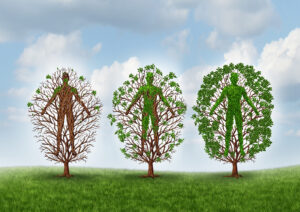Photo credit: Warner Bros. Pictures
Have you seen Barbie yet? If not, why not? Seriously, why not? No matter your gender identity, sexual orientation, age, ethnicity or relationship status, Barbie speaks to us all.
If you have seen it, like me you may think it was phenomenal. If it felt a little confronting, Barbie did its job. If it made you angry, Barbie did its job, If it made you think about or rethink your experiences, Barbie did its job. If it made you laugh out loud, often, Barbie did its job. If you marvelled at how the story was told and the production, Barbie did its job.
Barbie was born on 9 March 1959, which makes her 63 years old (we are contemporaries). Except, Barbie was born as a 19-year-old, which makes her 82 years old. She has seen many changes. Powers rise and fall, governments come and go. She has endured through war, civil uprisings, flower power, the war on drugs, civil rights movements, women’s rights movements, indigenous rights movements and climate change reaching a critical point. She has seen history made, big changes, small changes and some not so much changes.
The not so much is reflected in the following experience I had a couple of hours before seeing the movie. Entering a pet food store with a friend, (this is how commonplace such experiences are, in banal going about daily life settings), a man entering at the same time interrupts our conversation to say to me, “More women are not dying their hair these days. Your hair looks amazing. Don’t dye your hair. Promise me you’ll keep doing what you’re doing.” I am sure he walked away feeling like he had paid me a wonderful compliment, that I was flattered by his positive appraisal of me, perhaps even made my day. Certainly, in the hierarchy of objectification under the male gaze, this comment is relatively low on the list. Except, is it? Because it reflects so much about where we are still at as a society. It was an invasion of my space and conversation, to tell me in his opinion (which as a male must be valid and should be heard even though not sought or wanted), I look good (for my age).
I wrote about my frustration and irritation about this experience on social media. A male friend asked, “Did you tell him ?”, (what I had written in my post). I didn’t. Why? The thing is, it was one of literally thousands of comments (and much worse) that I have experienced since around the age of 14 years old – remember, Barbie and I were born in the same year. Is it women’s responsibility to challenge every time it happens? Particularly when our reactions are often met with derision, further put downs and at times great hostility – which I have also experienced too many times to remember when I have pushed back against sexism and sexual harassment. Do we need to discern the times it is important to respond and the times to ignore and keep walking?
This dilemma and frustration is eloquently expressed in the following monologue in Barbie by a Mattel employee played by America Ferrera.
“It is literally impossible to be a woman. You are so beautiful, and so smart, and it kills me that you don’t think you’re good enough. Like, we have to always be extraordinary, but somehow, we’re always doing it wrong.
You have to be thin, but not too thin. And you can never say you want to be thin. You have to say you want to be healthy, but also you have to be thin. You have to have money, but you can’t ask for money because that’s crass. You have to be a boss, but you can’t be mean. You have to lead, but you can’t squash other people’s ideas. You’re supposed to love being a mother, but don’t talk about your kids all the damn time. You have to be a career woman but also always be looking out for other people.
You have to answer for men’s bad behavior, which is insane, but if you point that out, you’re accused of complaining. You’re supposed to stay pretty for men, but not so pretty that you tempt them too much or that you threaten other women because you’re supposed to be a part of the sisterhood.
But always stand out and always be grateful. But never forget that the system is rigged. So find a way to acknowledge that but also always be grateful.
You have to never get old, never be rude, never show off, never be selfish, never fall down, never fail, never show fear, never get out of line. It’s too hard! It’s too contradictory and nobody gives you a medal or says thank you! And it turns out in fact that not only are you doing everything wrong, but also everything is your fault.
I’m just so tired of watching myself and every single other woman tie herself into knots so that people will like us. And if all of that is also true for a doll just representing women, then I don’t even know”.
In a recent article in the Guardian, The predictable backlash after the recent fallout from the Lehrmann trial can’t undo #MeToo’s momentum, Kristine Ziwica writes, “the Sofronoff inquiry has shone a light on the longstanding failure of the criminal justice system to deliver anything resembling “justice” to complainants. It is representative of the way the system retraumatises; representative of the way rape myths reign supreme, clouding the judgement of the police who investigate these cases and decide which have “merit”; and representative of the extent to which rape myths pervade media reporting when a case is deemed “high profile” … “What’s more, the events following the case are representative of the shameful way complainants have consistently been thrown under the bus as the #MeToo movement in Australia unfolded”.
There is no comparison between the ignorant and sexist comment made to me in the pet store and allegations of rape or sexual assault. Yet, it is these ‘small’ intrusions and invasions that set the stage for worse to be perpetrated. The Barbie movie is a timely reminder of how far we have come as well as how far we have to go.
But I finish on a hopeful note. Ziwica also reminds us that the first set of legislations recommended by former sex discrimination commissioner Kate Jenkins in her report into sexual harassment and assault into parliamentary workplaces is right now being introduced. There has already been full implementation of Jenkin’s 55 recommendations from her landmark inquiry into sexual harassment, Respect@Work. She rightly points out, “None of this would have happened if Higgins hadn’t come forward”.
She says, … “I hope Brittany – and all the other women watching and wondering if anything they do will make a difference – knows that. This undeniable momentum is precisely why those on the wrong side of history, those agents of backlash, are working themselves into a lather. That’s always the case.”
If you haven’t seen Barbie yet, I encourage you to go. I think you’ll love it!
Postscript
In the past 24 hours this blog has generated some interesting thoughts and disclosure of experiences. A couple of people have asked if I would feel the same if a woman had made the same comment about my hair instead of a man. This is a false equivalence. The disparities and inequities built into the structure of our societies, makes this analogy redundant.
More to the point, the disparities and inequities in society are more likely to translate into an entitlement to make comments like, “you would be so much prettier if you lost a little weight” or “take that rag off your head so I can see your face” “or “smile gorgeous”. To be clear, I am not referring specifically to the pet store man or men in general. I am talking about a system that as the Mattel employee states, is ‘rigged’ and where these are everyday occurrences for women.
Recently, a woman at a concert I went to tapped me on the shoulder as I walked by and said “excuse me, I just wanted to say your hair looks amazing. I have been struggling with stopping dying my hair, but you have inspired me and I’m going to push through the growing out phase.” I stopped and we chatted for a couple of minutes. It felt very different.











